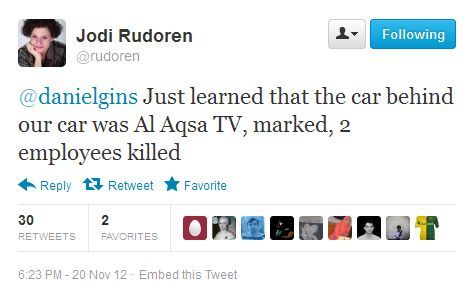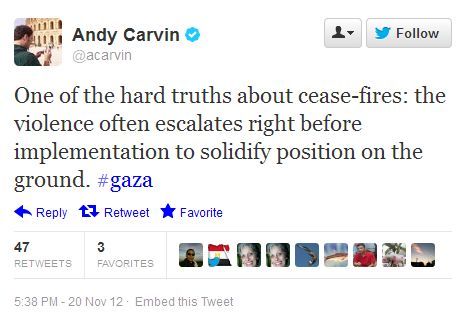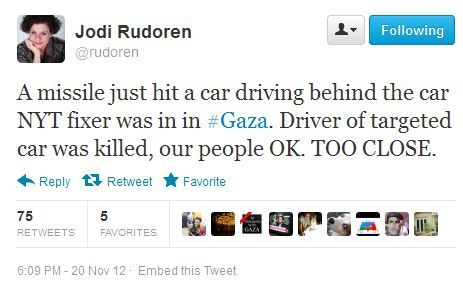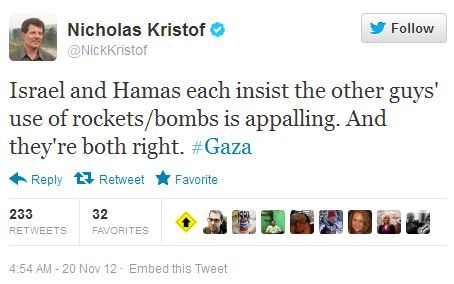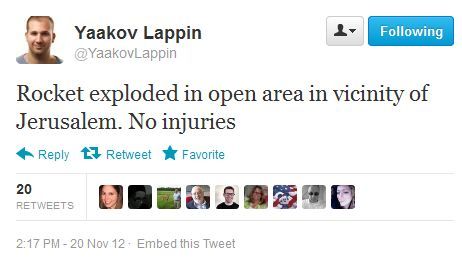 I’m liveblogging the media war from the HonestReporting headquarters in Jerusalem. Come back to this page throughout the day for the latest developments.
I’m liveblogging the media war from the HonestReporting headquarters in Jerusalem. Come back to this page throughout the day for the latest developments.
This is Tuesday’s liveblog. For Wednesday’s, click Liveblogging Israel’s Media War 11/21/2012.
For the duration of the Gaza conflict, turn to HonestReporting for everything you need to know.
8:12 pm: Jodi Rudoren follows up on her earlier tweet:
Marked? Marked as press? Come on, Jodi. Al Aqsa TV is a Hamas mouthpiece, not independent journalism.
7:29 pm: This is what I call collateral damage waiting to happen. After the IDF dropped leaflets over Gaza warning Palestinians in certain neighborhoods to evacuate their homes, Hamas responded by going on TV and telling Gazans to ignore the leaflets and act like good human shields.
Hamas Interior Ministry Spokesperson: This is all part of the psychological warfare held by the Zionist enemy… So by using this way of communication, our public radio, I address all our Palestinian brothers by saying: Please do not listen to the orders noted on these text messages, their only purpose is spreading fear and panic within our people.
7:01 pm Tried making sense of conflicting reports of a cease fire starting tonight. I’ll believe it when I see it. Andy Carvin‘son my wavelength:
6:20 pm: Some Gaza jihadis were killed in an airstrike this afternoon. The targeted killing assisted martyrdom operation was uncomfortably close to NY Times personnel:
5:30 pm Sderot children suffering trauma from a decade of rocket fire is a very under-reported story. I’m glad CBS News picked up on this.
5:25 pm: Israel’s feeling the love from Canadian columnists Jonathan Kay and Peter Worthington.
5:18 pm: Being on the receiving end of Qassam rockets and having family ties in Gaza means Israeli Bedouins are walking a tightrope.The Christian Science Monitor writes:
Despite their links to Gaza, Rahat residents have a real chance of being hit by one of the rockets soaring into Israel, al-Karawani says.”Why won’t Rahat also be hit by a missile? We have no immunity,” he says.
5:03 pm: National Post cartoonist Gary Clement channeled his inner Richard Cohen.

4:58 pm: As far as Aaron David Miller‘s concerned, Hamas already won the war, because it trumped Abbas. Israel’s peace partner can’t deliver Gaza and is therefore irrelevant to the crisis talks.
Irony of ironies, it was Hamas that emerged as the object of Israel’s real attentions — the Islamist nationalists, it turned out, had what Israel needed and could deliver it. When Israel wanted a ceasefire, who did it negotiate with? Hamas, not Abbas. When Israel wanted Gilad Shalit back, who did it negotiate with? Hamas, not Abbas.
4:27 pm: HonestReporting CEO Joe Hyams was filming when the sirens went off. We briefly evacuated the office.
4:19 pm: Now I’m reading Dennis Ross and Alan Dershowitz.
4:12 pm: I’m reading Israel Launches “Citizen’s War Room”
4:03 pm: Your daily dose of moral equivalence from Nick Kristof.
3:58 pm: It was two rockets that landed near Jerusalem earlier.YNet notes they were fired minutes before UN chief Ban Ki-moon arrived in the city.
3:45 pm: Ethiopian immigrants who arrived in Israel only a week ago aren’t flinching at the rocket fire and sirens. The JTA writes:
The Alemas were among 91 Ethiopian immigrants who arrived in Israel last week, just a day after Israel’s Operation Pillar of Defense began. The new olim immediately were sent to the Ibim immigrant absorption center, a former aliyah youth village run by the Jewish Agency for Israel about three miles from the Gaza border. Other immigrant absorption centers were full. . .
“In Ethiopia, we slept on the floor, on top of each other,” Alema said. His wife, Yikanu, added, “We had no light. We had leeches. That’s why we’re happy here.”
The Ethiopian immigrants didn’t venture far from their apartments in case an alarm sounded and they had to run back inside.
2:55 pm: Michael Oren discussed the crisis with CNN, fielding questions about civilian casualties, cease fire possibilities, and more. Erin Burnett also interviewed the PLO’s Maen Rashid Areikat, which Oren refers to.
2:50 pm: I’m reading this McClatchy News analysis:
U.S. approach to Gaza-Israel talks shows new reluctance to referee Mideast conflicts
2:42 pm: A Baltimore Sun staff-ed channels its inner Richard Cohen:
Yet Hamas’ leaders seem indifferent to the deaths of innocent Palestinian civilians their actions have invited; indeed, they may even welcome the growing body count as a propaganda victory. The deliberate manner in which have put their own citizens at risk by locating military forces and equipment in civilian areas shows the utter ruthlessness and immorality of which they are capable.
The Sun published Zainab Chaudry‘s dissent.
2:38 pm: LOL: A Christian Science Monitor staff-ed puts a lot of faith in moderate Egyptian Islamists to mediate an end to the Gaza crisis.
2:28 pm: Where was I when all this started? Oh yeah. Brendan O’Neill — Daily Telegraph:
Why is Israeli militarism looked upon as more disgusting, despicable and criminal than the militarism of any other nation on Earth?
2:24 pm: I didn’t leave the office, but other HR staffers did. They heard the explosion, I didn’t. It took an air raid siren and a Fajr-5 to get some peace and quiet in the office. Time to check on the wife.
2:16 pm: Sirens stopped.
2:14 pm: Sirens in Jerusalem. Eerie to hear from the office.
2:02 pm: Whoda thunk? Danny Ayalon’s commentary in The Guardian is currently Comment is Free’s most-read article.
1:30 pm: The cycle of violence isn’t a Hamas bike-a-thon. And it’s not an apt term to describe the fighting. And yet we have a staff-ed in The Independent and a Washington Post headline using those terms. What’s wrong with this metaphor?

1:12 pm: If this isn’t the dumbest commentary I see all day, I can only wonder what will top Dan Glazebrook (The Independent). He quotes Hassan Nasrallah extensively enough to (in his own words) conclude:
If Syria does fall, therefore, we can expect to see far more Israeli massacres of the type now currently under way. Not only will Syria be knocked out of the ‘resistance axis’ altogether, and Hezbollah left without a supply line from Iran, but Iran itself will be left isolated and less able to provide the Gazans with the missiles that currently provide their only effective deterrent to a renewed Israeli occupation.
12:58 pm: Maybe I’m stretching a little, but I suspect the “inherent international dimensions” referred to in this Times of London staff-ed subconsciously refers to the foreign press. What do you think?
In Syria the regime has managed to seal off its civil war from the rest of the world. In Gaza the conflict’s inherent international dimensions give at least some grounds for hope.
12:49 pm: I’m looking at the latest from Times of London cartoonist Peter Brookes.

12:43 pm: Forget about anonymous diplomatic sources. Gimme more grunts, Times of London:
A six-strong Israeli artillery crew, having breakfast in a café this morning, told The Times that their state of alert had been progressively downgraded over the last 48 hours, and that their commander had told them they would be “home by the weekend”.
12:27 pm: A Daoud Kuttab op-ed treats LA Times readers to an assortment of cliches. We’ve got the cycle of violence, Israel’s actions are “almost certain to produce a new crop of militants,” disproportionate response, “deterrence becomes indistinguishable from collective punishment,” and the absence of a political horizon. But my favorite?
The killing of civilians by either side can’t be condoned, and it’s true that Gazan missile attacks have killed several Israeli civilians. But . . .
 11:59 am: The NYT’s also cranking the content, visiting Ashkelon and this nice infographic on rocket ranges. And Jodi Rudoren describes the Gaza funeral of seven-year-old Jamal Dalu:
11:59 am: The NYT’s also cranking the content, visiting Ashkelon and this nice infographic on rocket ranges. And Jodi Rudoren describes the Gaza funeral of seven-year-old Jamal Dalu:
At the destroyed Dalu family home, a man climbed atop the pile of rubble where a dozen photographers had positioned themselves and hoisted the body of one of the four dead children into the air several times, as though a totem. . .
Much of the militant pageantry most likely was meant as a message for the news media, and thus the world, given how the Dalus had instantly become the face of the Palestinian cause. But the tone, far more fundamentalist than funereal, was also a potent sign of the culture of martyrdom that pervades this place, and the numbness that many here have developed to death and destruction after years of cross-border conflict.
11:52 am: More hand-wringing in the NYT op-ed section from Roger Cohen, and Dan Raviv and Yossi Melman.
11:33 am: A NY Times staff-ed weighs in on the fighting. But don’t be fooled by the Hamas’s Illegitimacy headline. This piece spreads blame around in such a mealy-mouthed way, I wonder if it violates any truth-in-advertising laws . . .
11:25 am: WashPost still cranking content: In Gaza, line between militants and population is thin.
11:18 am: Hillary Clinton’s visiting the region, and she’s not meeting with Hamas. Washington Post coverage.
11:12 am: I’m watching a feisty moment at Foggy Bottom. AP‘s Matthew Lee is impatient with State Dept. spokesperson Victoria Nuland and his feeling that Israel’s being left hanging.
Lee was picking up on how the Gaza conflict is driving a wedge between the US and Turkey. More on that at the Washington Post.
11:04 am: HonestReporting’s Simon Plosker was among a group of Israelis and Palestinians appearing on BBC World Service to discuss the media war. If you missed last night’s broadcast, you can still listen here.
10:54 am: Canadian cartoonist Cam Cardow channels his inner Richard Cohen.
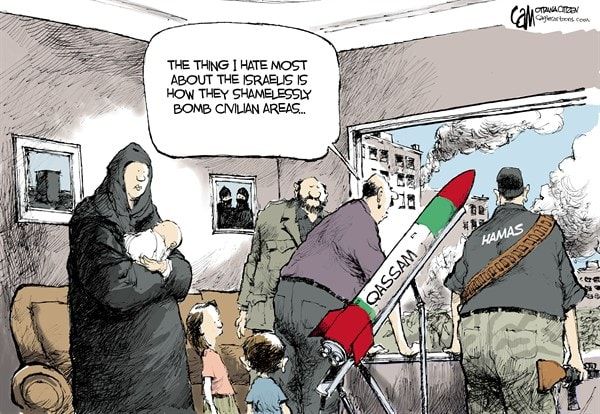
10:39 am: Must read: Washington Post columnist Richard Cohen slams Hamas callousness — and the media’s whitewashing of it:
In recent days, some editorialists have bemoaned the war and Hamas’ role in inciting it. But then comes the inevitable “however.” “However, the government of Benjamin Netanyahu must also take much blame for stoking resentment among Palestinians in Gaza and the West Bank for so long,” opined the Financial Times. The New York Times’ caveat came lower down in its initial editorial on the war: “But it would be easier to win support for retaliatory action if Israel was engaged in serious negotiations with Hamas’ rival, the Palestinian Authority.” Apparently, 700 rockets are not enough.
10:24 am: Thumbs up to AP for shedding light on the bank destroyed in this morning’s air strike:
Leading Hamas members set up the bank after it violently overran Gaza in June 2007 because foreign lenders, afraid of running afoul of international terror financing laws, stopped doing business with the militant-led Gaza government. . . .
The inside of the bank, which was set up by leading Hamas members and describes itself as a private enterprise, was destroyed.
10:14 am: The Times of Israel picked up on CUFI‘s efforts to get Hamas banned from Twitter.
10:04 am: Cyber-attacks on Israel, by the numbers (based on Israel HaYom)
1 million: cyber-attacks on Israel in the last 24 hours
1,000: Israeli sites hacked in the last 24 hours
44 million: cyber-attacks against Israel since Operation Pillar of Defense began.
10 million: attacks on the President‘s web site.
7 million: attacks on the Ministry of Foreign Affairs web site.
3 million: attacks on the Prime Minister‘s web site.
3,000: Hacked Israeli email accounts
thousands: Hacked Israeli Facebook accounts
9:29 am: Wall Street Journal editor apologizes — for a 2006 column supporting the Gaza disengagement. Bret Stephens (click via Google News) writes:
Sometimes it behooves even a pundit to acknowledge his mistakes. In 2004 as editor of the Jerusalem Post, and in 2006 in this column, I made the case that Israel was smart to withdraw its soldiers and settlers from the Gaza Strip. I was wrong . . .
Put simply, Israel’s withdrawal from Gaza yielded less security, greater diplomatic isolation, and a Palestinian regime even more radical and emboldened than it had been before. As strategic failures go, it was nearly perfect.
9:17 am: Speaking of CNN, Wolf Blitzer was filming in Ashkelon when the sirens went off, sending Blitzer and his crew scrambling inside the very same school that was hit by a rocket the day before.
9:08 am: CNN reports that three US navy ships in the eastern Mediterranean are on standby in case American citizens in Israel need to be evacuated.
The officials stressed an evacuation remains an extremely remote possibility and the Obama administration is not currently planning for one.
8:59 am: Daryl Cagle rounded up a bunch of Gaza War cartoons. Martyn Turner of the Irish Times provides your daily dose of moral equivalence:
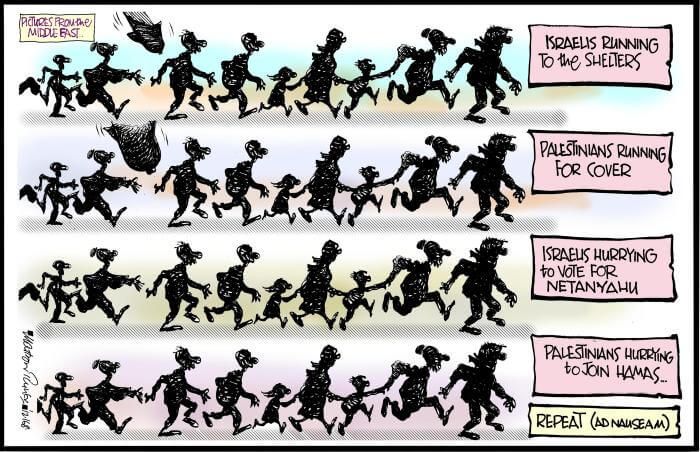
8:48 am: I’m reading Amir Mizroch‘s Lessons From the Second Six-Day War.
8:41 am: JPost: This morning, a barrage of 16 rockets was fired at Beersheva. Iron Dome intercepted 13. Several people are being treated for shock. During the night, the IAF struck 100 targets in Gaza, including “the National Islamic Bank which Hamas uses to pay its employees.”

